Items
Subject is exactly
Business & Industry
-
2023-07-21
A Year of Betrayal
This doesn't need to be long I am just glad to have a way to express how incredibly disappointed I have been throughout the course of this pandemic. In the first few months after the outbreak, most of us relied heavily on the public governmental briefings by Dr Fauci and others, and we eagerly awaited the development of tests and vaccines by the pharmaceutical industry. We trusted that our government and our doctors were working earnestly to provide good solutions to a terrible problem, quickly. But if we fast forward a few years, what a horrible change has transpired! Pretty much everyone who we trusted at the beginning of the pandemic has been proven either a downright liar or to have been working for their own private interests all along. Dr Fauci couldn't get his story straight - repeatedly - over simple matters, and lied again and again about the connection between the virus, the government, and the Wuhan virology lab. Though various remedies (like ivermectin) were decried as malicious and dangerous, we now know that the pharmaceutical companies we were busy trusting were pushing to consider the use of ivermectin medical malpractice, because they wanted an emergency use authorization for their insufficiently tested and experimental vaccines. Some of us already knew we couldn't trust our government, but most of us hoped that we could at least trust our doctors. What a disappointment. -
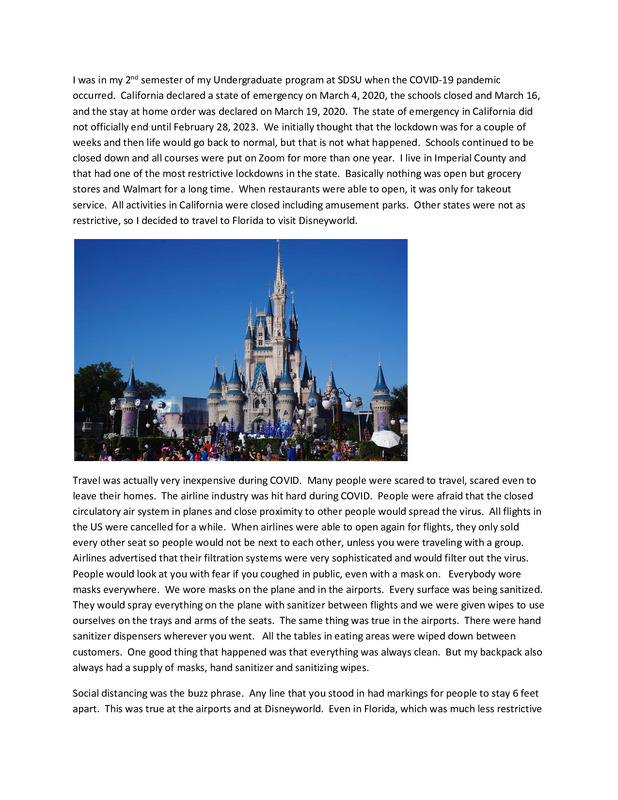 2020-10-10
2020-10-10Disney During The Pandemic's Lost Year - A Glimmer of Fun in Chaos
Half full fights, social distancing and Disneyworld -
2021-06-01
Post-pandemic Beach Trip
Unlike most people that we knew, we did not travel anywhere during the pandemic. We did not have any visitors outside of our family and continued to use social distancing until the restrictions were lifted. When the world opened up again, we still chose to stay fairly close to home. At the time, we were living in Harrisburg, PA and decided to visit Virginia Beach. We stayed at the Hilton and were shocked to see how to the pandemic had effected the tourism industry. The hotel was wildly understaffed as they had let many employees go over the past year and it was chaotic. The rooms were not cleaned on time for check-in so there were people packed into the lobby, bags everywhere, just waiting to get to their rooms. The employees were overworked and mostly rude; wholly unlike how it had been pre-pandemic. When we were finally able to check into our room, we got onto the elevator and found that there was some kind of liquid all over the floor. We tried to show an employee but there were none around to help. After getting into our room, we pulled out the sofa bed to find that it was full of sand and that the room had not been properly cleaned. Eventually, someone did come up to clean it but it took hours. Our trip could be summed up as unrelaxing; nearly every employee seemed as though they were at their limits. There were still mask guidelines in place and all of the people there seemed angry about it, whether it was because they were wearing one and others weren’t or because they did not want to wear one and were angry that the guidelines told them to. It seems as though no one could be satisfied and everyone was inconvenienced no matter which side they were on. -
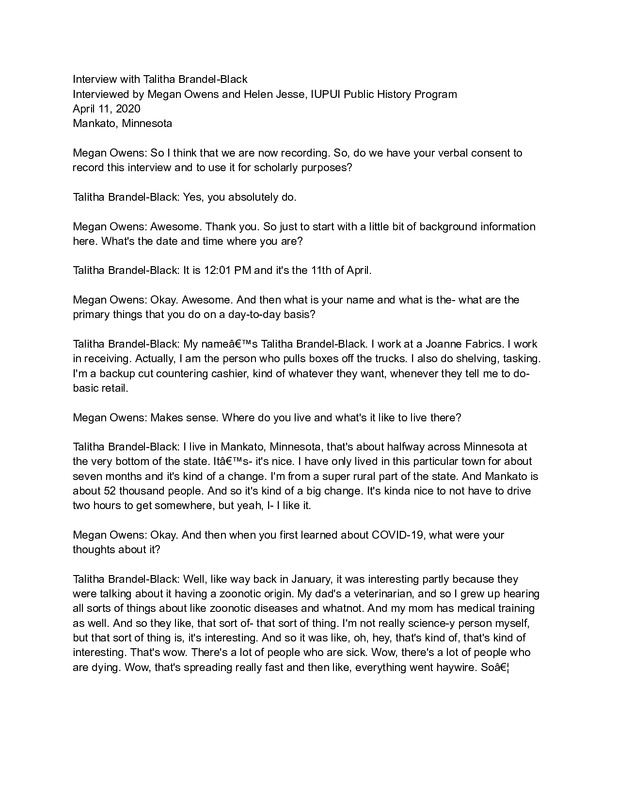 04/11/2020
04/11/2020Talitha Brandel-Black Oral History, 2020/04/11
-
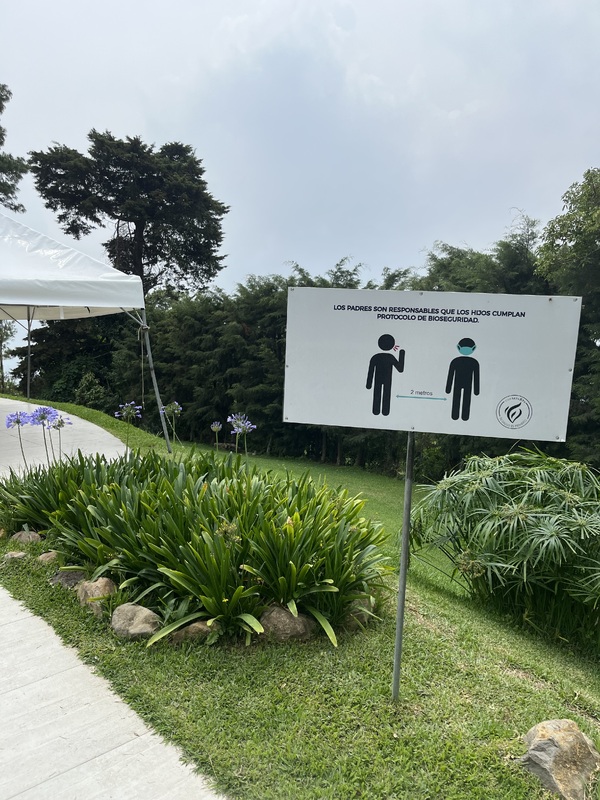 2023-04-29
2023-04-29Post COVID in El Salvador
I recently went on a trip with my dad to his home of El Salvador. I wasn’t too surprised that most COVID restrictions had been lifted three years later. I was more surprised that some people were still wearing masks. I leaned that people who work hospitality are still required (or strongly suggested) to still wear masks. There are hardly any remnants left from all the COVID mandates but I found these signs at one of the restaurants we went to reminding people to social distance. It’s interesting to see people now still wearing masks and sanitizing their hands in excess. I wonder if this is the “new norm” we were all talking about two years ago. -
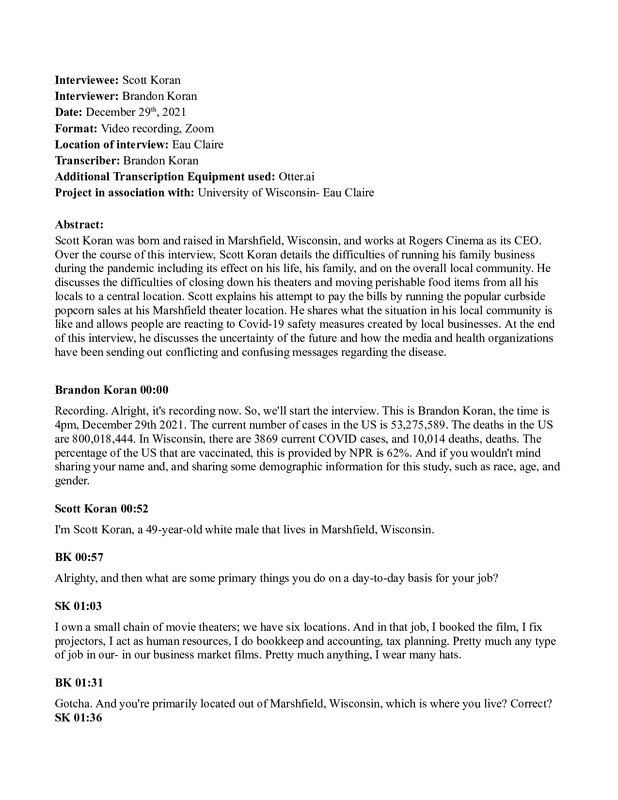 12/29/2021
12/29/2021Scott Koran Oral History, 2021/12/29
Scott Koran was born and raised in Marshfield, Wisconsin, and works at Rogers Cinema as its CEO. Over the course of this interview, Scott Koran details the difficulties of running his family business during the pandemic including its effect on his life, his family, and on the overall local community. He discusses the difficulties of closing down his theaters and moving perishable food items from all his locals to a central location. Scott explains his attempt to pay the bills by running the popular curbside popcorn sales at his Marshfield theater location. He shares what the situation in his local community is like and allows people are reacting to Covid-19 safety measures created by local businesses. At the end of this interview, he discusses the uncertainty of the future and how the media and health organizations have been sending out conflicting and confusing messages regarding the disease. -
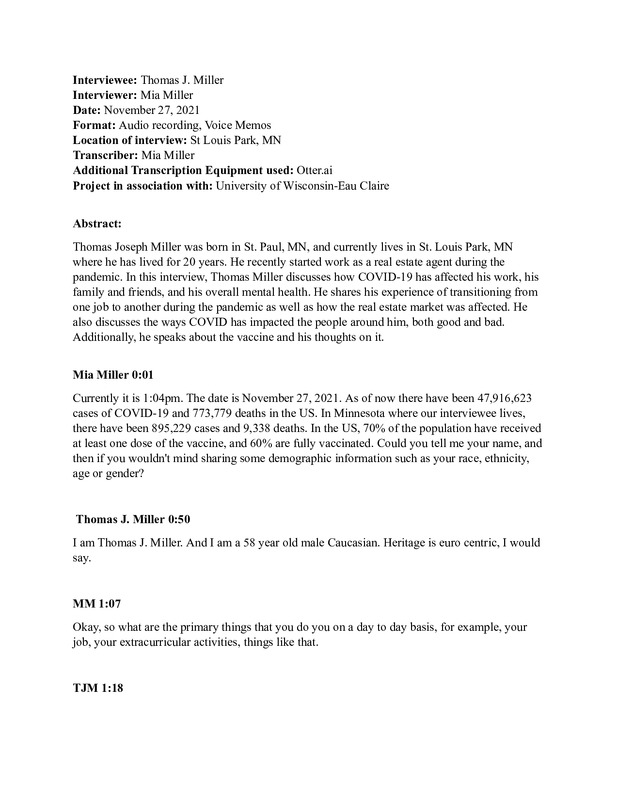 11/27/2021
11/27/2021Thomas J. Miller Oral HIstory, 2021/11/27
Thomas Joseph Miller was born in St. Paul, MN, and currently lives in St. Louis Park, MN where he has lived for 20 years. He recently started work as a real estate agent during the pandemic. In this interview, Thomas Miller discusses how COVID-19 has affected his work, his family and friends, and his overall mental health. He shares his experience of transitioning from one job to another during the pandemic as well as how the real estate market was affected. He also discusses the ways COVID has impacted the people around him, both good and bad. Additionally, he speaks about the vaccine and his thoughts on it. -
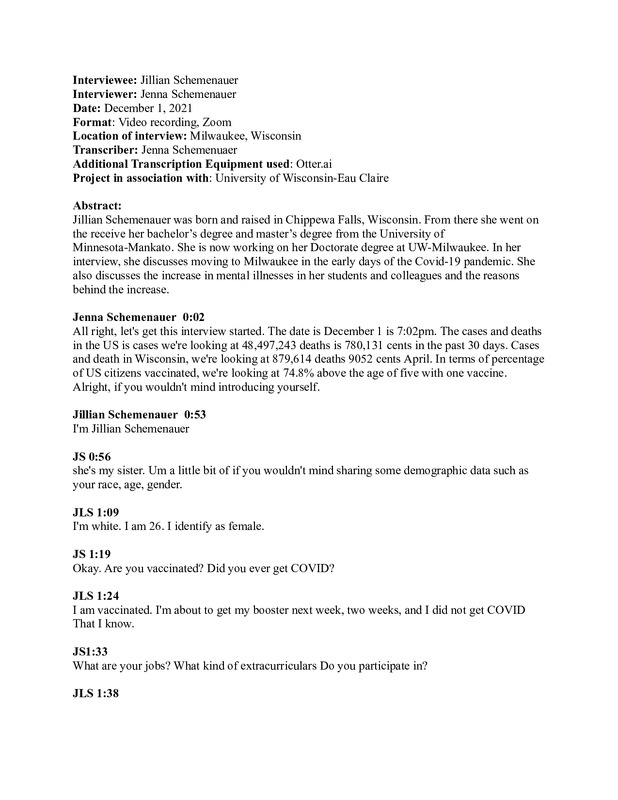 12/01/2021
12/01/2021Jillian Schemenauer Oral History, 2021/12/01
Jillian Schemenauer was born and raised in Chippewa Falls, Wisconsin. From there she went on the receive her bachelor’s degree and master’s degree from the University of Minnesota-Mankato. She is now working on her Doctorate degree at UW-Milwaukee. In her interview, she discusses moving to Milwaukee in the early days of the Covid-19 pandemic. She also discusses the increase in mental illnesses in her students and colleagues and the reasons behind the increase. -
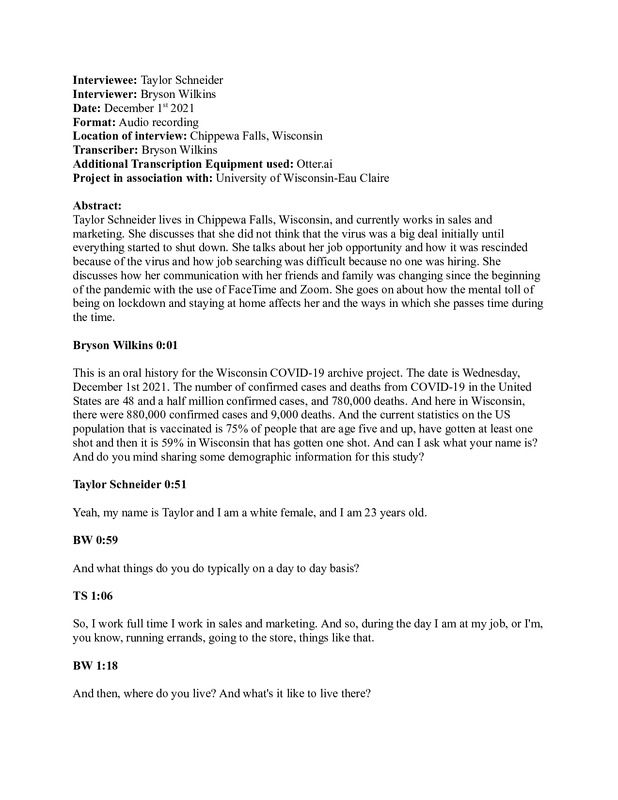 12/01/2021
12/01/2021Taylor Schneider Oral History, 2021/12/01
Taylor Schneider lives in Chippewa Falls, Wisconsin, and currently works in sales and marketing. She discusses that she did not think that the virus was a big deal initially until everything started to shut down. She talks about her job opportunity and how it was rescinded because of the virus and how job searching was difficult because no one was hiring. She discusses how her communication with her friends and family was changing since the beginning of the pandemic with the use of FaceTime and Zoom. She goes on about how the mental toll of being on lockdown and staying at home affects her and the ways in which she passes time during the time. -
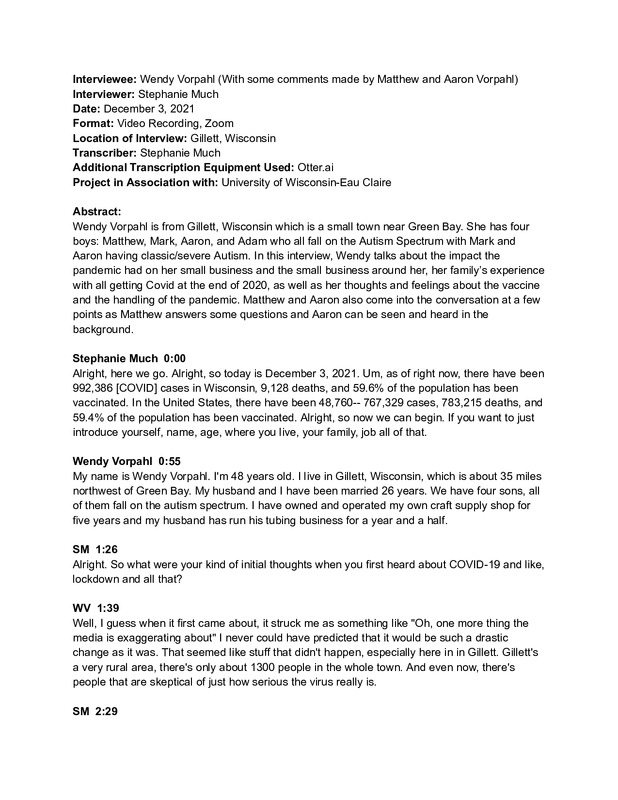 12/03/2021
12/03/2021Wendy Vorpahl Oral History, 2021/12/03
Wendy Vorpahl is from Gillett, Wisconsin which is a small town near Green Bay. She has four boys: Matthew, Mark, Aaron, and Adam who all fall on the Autism Spectrum with Mark and Aaron having classic/severe Autism. In this interview, Wendy talks about the impact the pandemic had on her small business and the small business around her, her family’s experience with all getting Covid at the end of 2020, as well as her thoughts and feelings about the vaccine and the handling of the pandemic. Matthew and Aaron also come into the conversation at a few points as Matthew answers some questions and Aaron can be seen and heard in the background. -
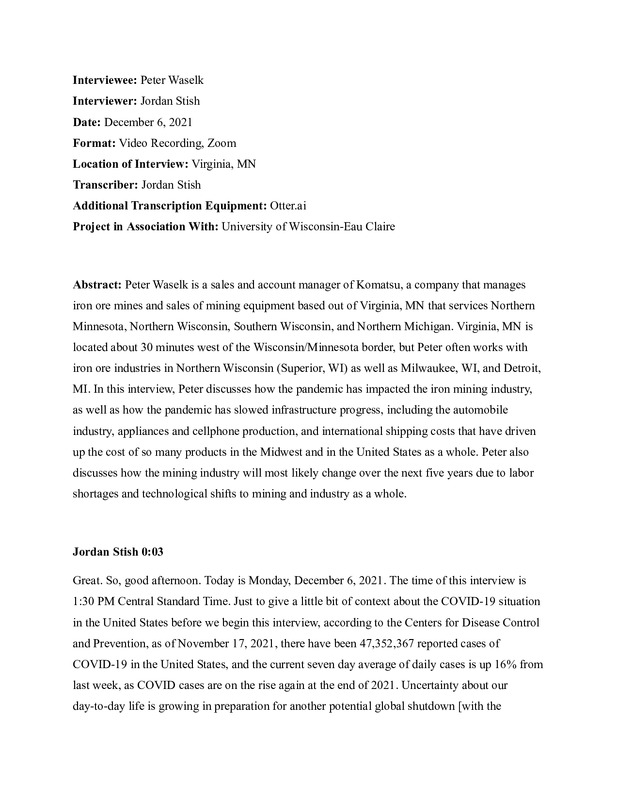 12/06/2021
12/06/2021Peter Waselk Oral History, 2021/12/06
Peter Waselk is a sales and account manager of Komatsu, a company that manages iron ore mines and sales of mining equipment based out of Virginia, MN that services Northern Minnesota, Northern Wisconsin, Southern Wisconsin, and Northern Michigan. Virginia, MN is located about 30 minutes west of the Wisconsin/Minnesota border. Still, Peter often works with iron ore industries in Northern Wisconsin (Superior, WI) as well as Milwaukee, WI, and Detroit, MI. In this interview, Peter discusses how the pandemic has impacted the iron mining industry, as well as how the pandemic has slowed infrastructure progress, including the automobile industry, appliances and cellphone production, and international shipping costs that have driven up the cost of so many products in the Midwest and the United States as a whole. Peter also discusses how the mining industry will most likely change over the next five years due to labor shortages and technological shifts to mining and industry as a whole. -
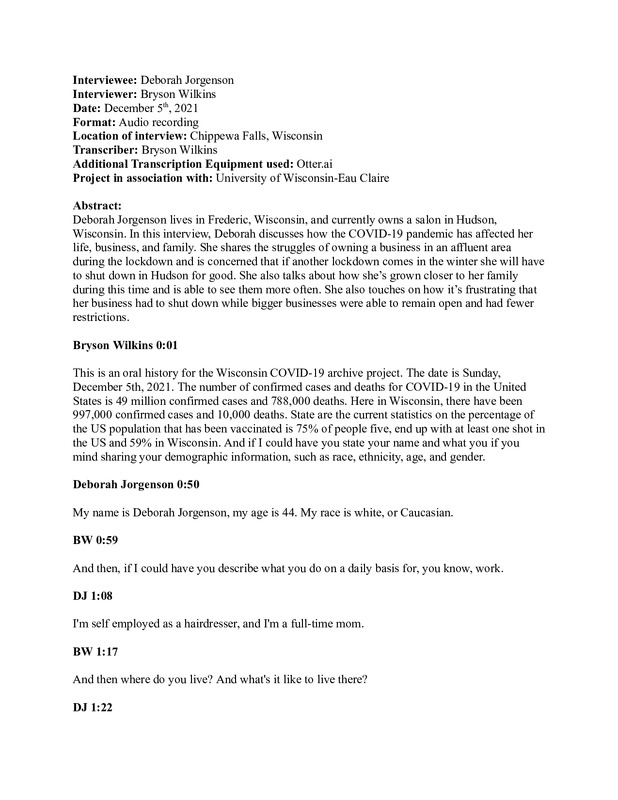 12/05/2021
12/05/2021Deborah Jorgenson Oral History, 2021/12/05
Deborah Jorgenson lives in Frederic, Wisconsin, and currently owns a salon in Hudson, Wisconsin. In this interview, Deborah discusses how the COVID-19 pandemic has affected her life, business, and family. She shares the struggles of owning a business in an affluent area during the lockdown and is concerned that if another lockdown comes in the winter she will have to shut down in Hudson for good. She also talks about how she’s grown closer to her family during this time and is able to see them more often. She also touches on how it’s frustrating that her business had to shut down while bigger businesses were able to remain open and had fewer restrictions. -
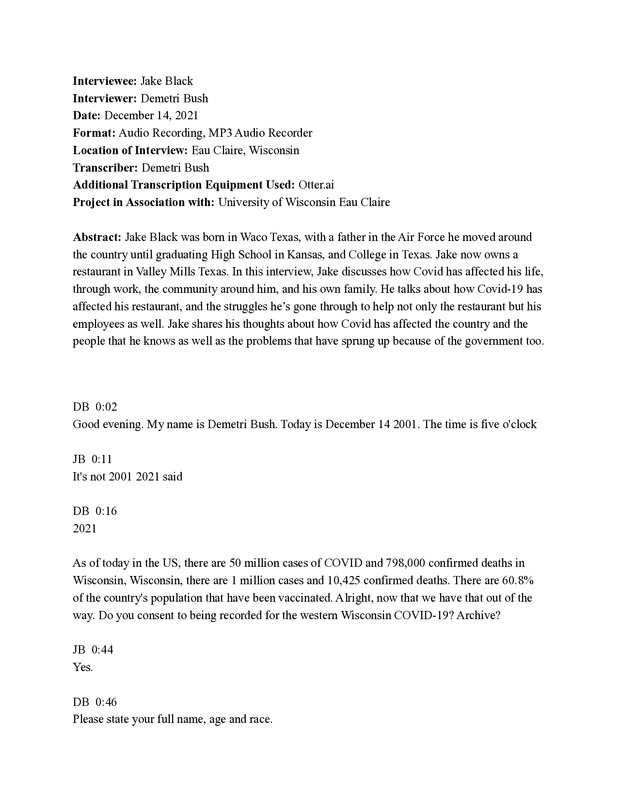 12/14/2021
12/14/2021Jake Black Oral History, 2021/12/14
Jake Black was born in Waco Texas, with a father in the Air Force he moved around the country until graduating High School in Kansas, and College in Texas. Jake now owns a restaurant in Valley Mills, Texas. In this interview, Jake discusses how Covid has affected his life, through work, the community around him, and his own family. He talks about how Covid-19 has affected his restaurant and the struggles he’s gone through to help not only the restaurant but his employees as well. Jake shares his thoughts about how Covid has affected the country and the people that he knows as well as the problems that have sprung up because of the government too. -
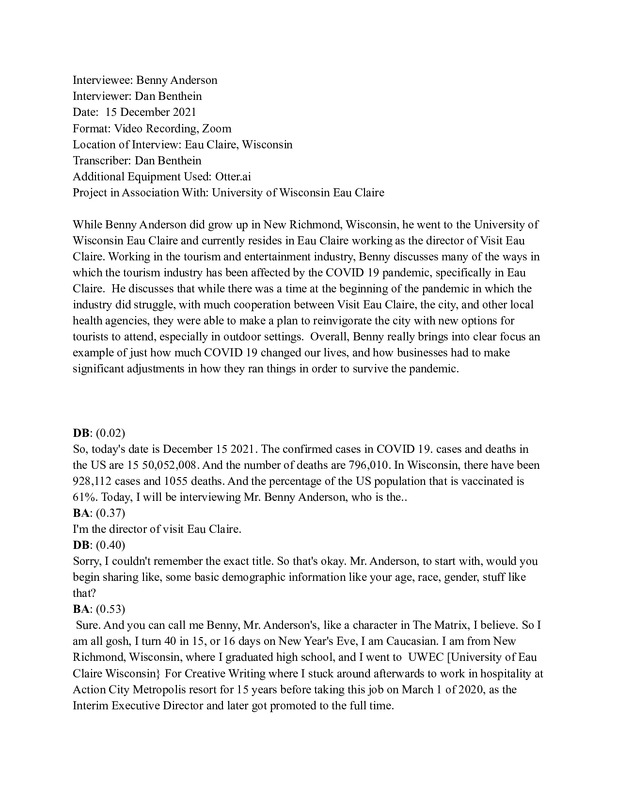 12/15/2021
12/15/2021Benny Anderson Oral History, 2021/12/15
While Benny Anderson did grow up in New Richmond, Wisconsin, he went to the University of Wisconsin Eau Claire and currently resides in Eau Claire working as the director of Visit Eau Claire. Working in the tourism and entertainment industry, Benny discusses many of the ways in which the tourism industry has been affected by the COVID-19 pandemic, specifically in Eau Claire. He discusses that while there was a time at the beginning of the pandemic in which the industry did struggle, with much cooperation between Visit Eau Claire, the city, and other local health agencies, they were able to make a plan to reinvigorate the city with new options for tourists to attend, especially in outdoor settings. Overall, Benny really brings into clear focus an example of just how much COVID-19 changed our lives, and how businesses had to make significant adjustments in how they ran things in order to survive the pandemic. -
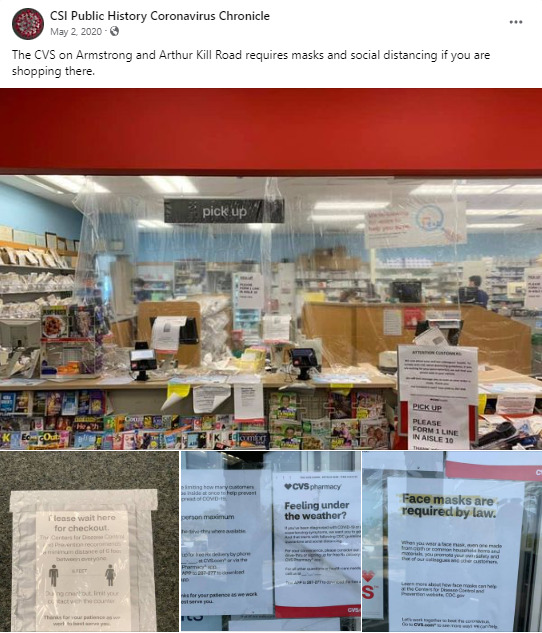 May 2nd, 2020
May 2nd, 2020CVS in Lockdown
The CVS on Armstrong and Arthur Kill Road requires masks and social distancing if you are shopping there. -
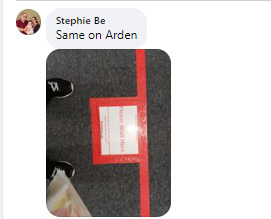 May 2nd, 2020
May 2nd, 2020Wait Here
Wait here. This was the story of Covid Life. We had to wait in specific spots, and not crowd registers until called on. This happened quite often, especially at the pharmacies! -
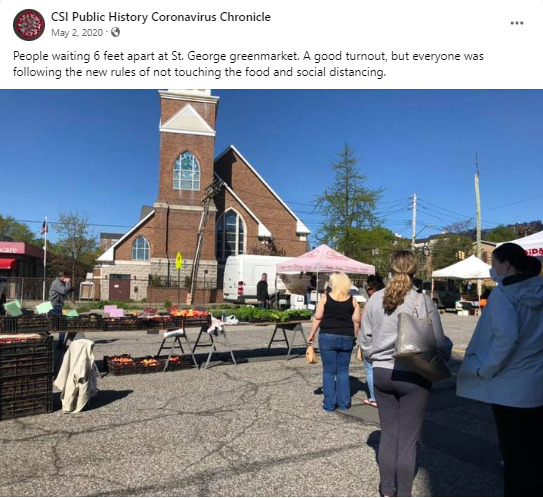 May 2nd, 2020
May 2nd, 2020Visiting the St. George Market
People waiting 6 feet apart at St. George greenmarket. A good turnout, but everyone was following the new rules of not touching the food and social distancing. -
 2020-06-05
2020-06-05Staten Island during the Covid-19 Pandemic
Photos depicting Staten Island Protest during Covid-19 -
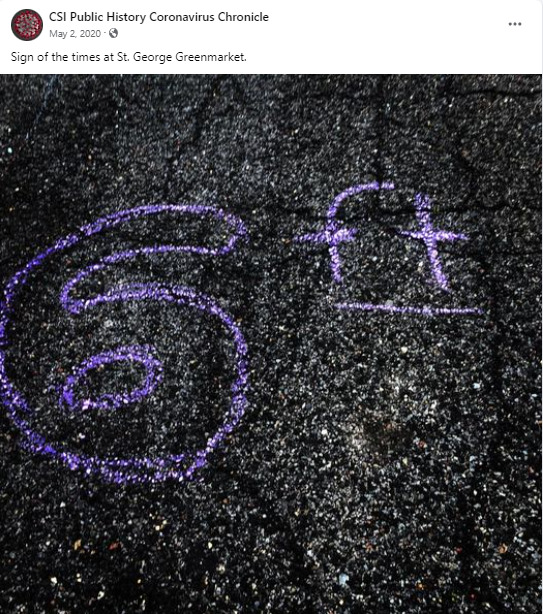 May 2nd, 2020
May 2nd, 2020Sign of the times at St. George Greenmarket.
Sign of the times at St. George Greenmarket. -
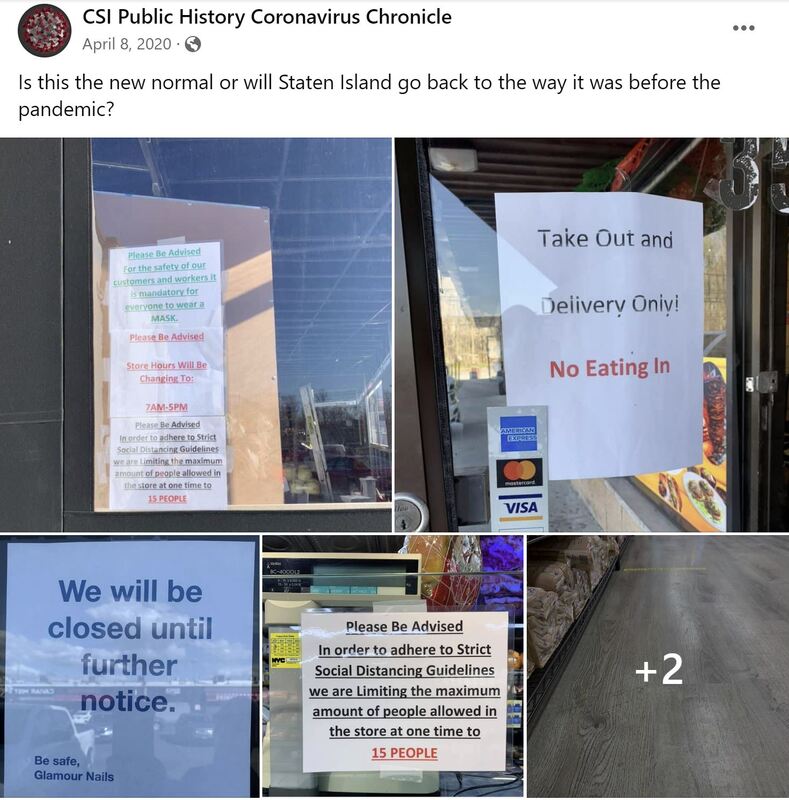 April 8, 2020
April 8, 2020The New Normal on Staten Island
Is this the new normal or will Staten Island go back to the way it was before the pandemic? -
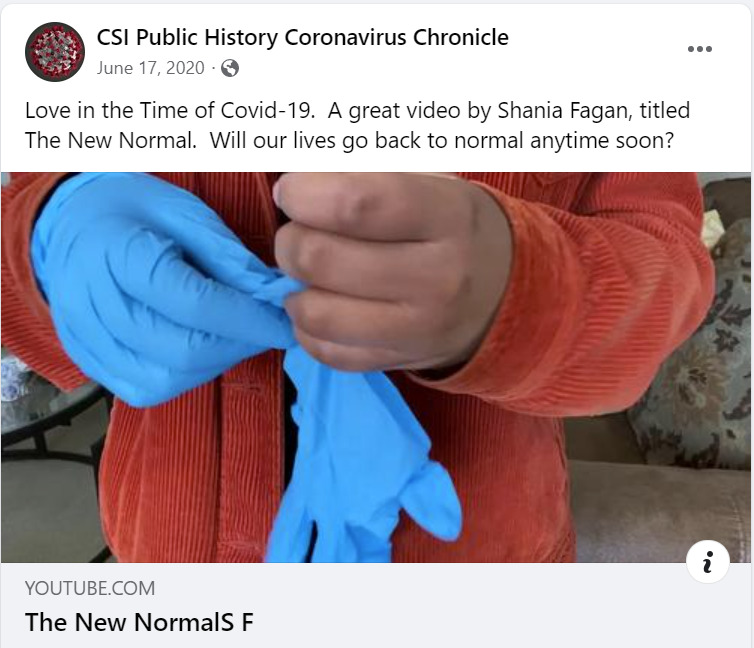 2020-06-17
2020-06-17The New NormalS F
Love in the Time of Covid-19. A great video by Shania Fagan, titled The New Normal. Will our lives go back to normal anytime soon? -
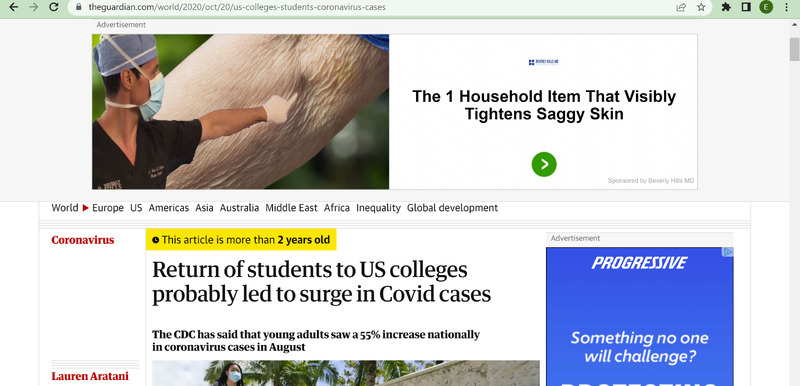 2020-10-20
2020-10-20How covid affected NYC?
Covid has affected everyone by the way you live your everyday life. Covid has affected New york city in many different ways , For example covid affected business to close down months including schools . Schools having to go remote . Another way New york city has been affected by the transit , The transit systems like the trains ,buses and commuter rail and ferries as a result to this the transportation has plummeted . For the subways in New York City it went down 90 percent and the buses went down 75 percent. The reason for this happening is people in quarantine and not going to work since some are working from home . Covid has affected health care workers. For example health care workers like doctors and nurses are around people who have it so they are more prone to get it. .This pandemic caused a lot of changes in the world. It caused everyone to be less social and not go out as much as it caused us to wear masks everywhere. It also caused a lot of people mental and emotional health to go down. For example there’s been a lot of social isolation which caused families to not be able to see each other as often. COVID-19 has impacted social mobility on child care cost and for families school dropout rate has increased due to fear of getting Covid. COVID-19 especially affected families due to not having jobs or working from home or being put on unemployment there’s been a big impact of Covid on families and family relationships creating a lot of tension and feeling depressed or not being united together. These pandemic parts of the population in different situations continue to affect people living in poverty situations with older people and disabilities. A lot of people have been put on unemployment and not being able to pay the rent. Covid has caused a lot of deaths and people could not be able to bury their loved ones. During The beginning of the year when the Pandemic was occurring depending on the situation of others some people were probably affected mentally Health care was provided to those who really needed it due to people not being able to pay for it and The state of new york lost money as well , It affected relationships and people got help by going therapy and staying connected to people . This pandemic affected many people personally. Covid has affected everyone's plan including travel because there's been travel bans and going to the airport has a lot of restrictions. A Lot of businesses are closing down to this pandemic by not giving income . Due to health care a lot of pregnant women had very high dress levels that affected their pregnancy . Which caused health care workers to be very aware of what was going on . Their risking their own lives to help us and young teens and kids were not able to fully able to enjoy the success of completing in graduating either high school such as prom or etc.it affected everyone's life and still is . This has caused a lot of stress and tension but has allowed people to be stronger in a sense and to appreciate the little things in life . Covid 19 has caused many hardships including loss of jobs . Some questions that still remain on this subject would be , When are things going back to normal ?, When is the vaccine coming out to prevent this ? When will this end ?. A message of hope i would say is everything will get better with time. The productivity has been slow due to employment going down ,People losing jobs . my personal experience with covid has become a learning experience . For example this pandemic has showed me to not take things for granted . -
2021-05-03
Business As Usual
I am a software engineer at a small, fairly conservative, company in PA. Because of its small company status it was never required for our employees to work from home, at least that was what they told us, and throughout the pandemic it was in fact a requirement that we work from the office. I wasn’t surprised when I was told I would be traveling to Washington state but I was apprehensive. A few of our employees were getting stick but I had so far been safe. On May 3rd 2021 I drove to the airport with a mask on my face and hand sanitizer in my hand. The airport was fairly empty as it was early but the few people that wandered the terminals were wearing masks. My flight was long but I got some sleep with the help of some Dramamine. That night my coworkers went out to eat but I decided to order in. The next morning I headed downstairs to head out for my first appointment. At the registration counter there were brown paper lunch bags sitting out in a neat row, the woman behind the desk asked me if I would like a breakfast bag to-go. As I walked over to pick up one of the bags she explained to me how due to Covid-19 they are not longer serving a hot buffet breakfast but are instead were providing this to-go bag options, I smiled from underneath my mask and thanked her. The bag had a banana, a granola bar, a yogurt and a bottle of water. I drove to the meeting site and headed inside, there were few people around but I noticed no one was wearing a mask, I felt like my light blue mask was a huge neon sign directing everyone’s attention to me. When I arrived at the designated meeting room I set up my computer and prepared the demo while I waited for others to arrive. One by one they walked in, greeted me, shook my hand and took a seat. Still no one was wearing a mask or if they were it was not secured properly, I felt embarrassed being the only one with a mask on. Once everyone arrived I stood up and looked at the room, everyone was looking right back at me, waiting. I took off my mask and began the meeting. The rest of the week was more of the same and the trip home was uneventful. A few days after getting home I tested positive for Covid-19 and was finally allowed to work from home, at least until I got better. -
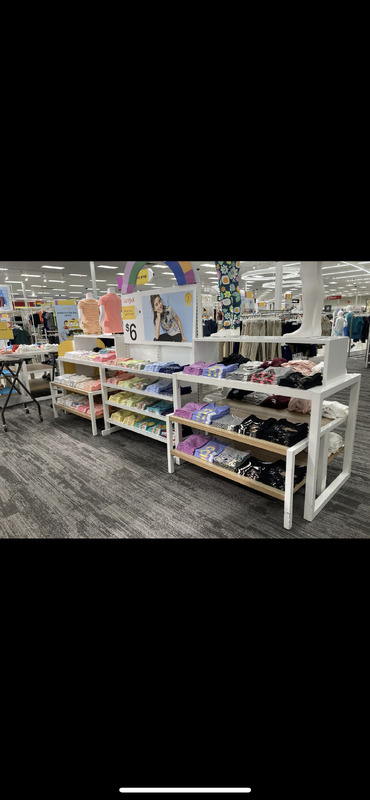 2020-07-01
2020-07-01Defender of Target
During COVID-19 I worked at Target. I was freshly 21 and like everyone else, was shocked by the intensity and severity of the pandemic. What had begun as a part-time gig quickly became my entire world. In the state I lived in, our store was considered an “essential business,” and therefore remained open. It was my job to stock and fold children’s clothes, maintaining a clean store front in the midst of the chaos. Throughout the early days, I would stand behind my folding table watching full-grown adults battle over toilet paper. They would line up outside of the store hours before it opened to ensure they’d receive a package of the holy grail. Suddenly, folding Peppa Pig shirts wasn’t my only duty. I became the protector of fitting rooms, the hunter of lost and contaminated clothing; gathering items that had been illegally tried on and stuffing them into their quarantine room, to “disinfect” for 3-5 business days. Being an essential employee during the pandemic made me jaded. It offered me insight into the human mind, a glimpse of what panic and fear can do to a person. I saw the worst, but also experienced kindness and empathy from people who understood what it was like to be caught in the midst of the hellfire. For some, Target turned into a safe haven, a place that remained open and reliable despite the madness going on in the world, while others gave up their sanity to keep it up and running. I will always think of my time at Target as a glitch in the matrix; a bizarre patch of time that tested the strength of a part-time sales associate, and humanity. -
2020-03
Gathering "Essentials"
March 2020. By now we have heard all the news about how COVID-19 is spreading and made it to the United States. The lockdowns were starting. I was working in a legal marijuana dispensary. A normal weekday at 2PM is our slow period, but this was different. We saw more customers than normal since most have been excused from work to start quarantining. By now most people have hoarded supplies such as food and toilet paper. But these customers were worried about being locked down without their weed. Customers were maxing out their legal limits they could buy. Shelves once full of edibles and vapes were running low. Nobody could have guessed that recreational marijuana would be considered essential, but to a lot of people it was. And that was the beginning of working through a pandemic. -
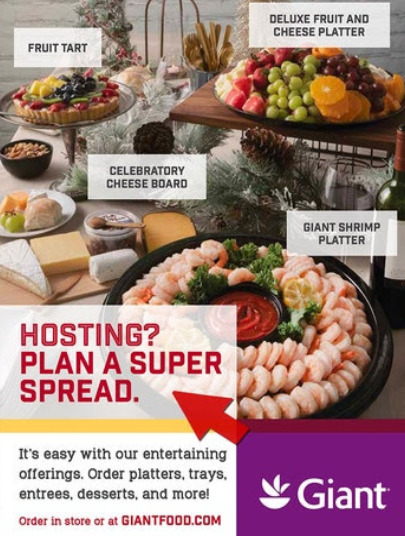 2020-11-18
2020-11-18"Grocery chain apologizes after releasing 'super spread' ad for Thanksgiving"
For generations that had never experienced a pandemic, the Coronavirus was not the only novel thing to adjust to. New nomenclature became the norm, including "Super spreader". The term was used to describe large groups gathering, especially during the holidays. Any other year, "plan a super spread" would be understood as a spread of food items. But for a population that was being restricted from large gatherings, in 2022, from holidays to Weddings to funerals, the company's attempt at clever advertising came off as tone-deaf and offensive. After backlash, Giant Food Stores formally apologized. -
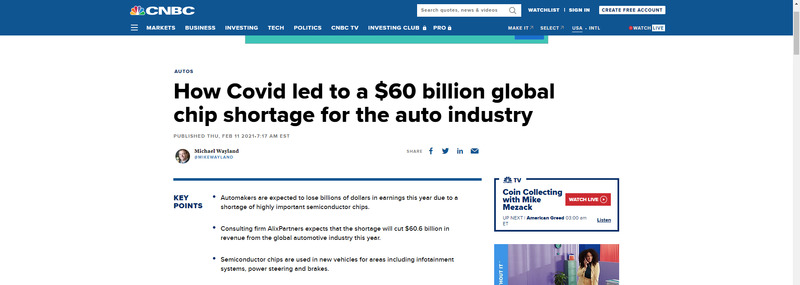 2021-02-11
2021-02-11How COVID led to a $60 billion global chip shortage for the auto industry
Article goes over the auto industry being affected by the pandemic. These kind of levels of economic interconnectivity really were exposed during the pandemic. -
2020-09-02
The Shaman in Francesco
When I went to work at Ernst and Young, I thought partners were going to figure out in a New York minute that I didn’t belong there because I lacked the intellectual curiosity, problem-solving talent, communication ability, or any of these characteristics of a professional consultant. I was extremely anxious on my first day. When I entered the Orange County office with its oil paintings hanging in the entryway and its staircase connecting the floor on which consulting Partners had offices to the floor on which audit Partners resided, I knew I didn’t belong there. Then I met Francesco; he was a shaman bearing wise council. I felt at ease instantly. Francesco’s friendship and advice were just what the doctor ordered. On the first project I managed, Francesco worked for me as a member of the consulting team. The Partner we reported to did not like Francesco. He didn’t like his style of communication, his style of dress, nor his accent–Francesco was Chinese-Indonesian. I gave up my integrity by sharing in the Partner’s dislike of Francesco. But my opinion was dishonest. He had been my savior, after all. Role forward six years, and Francesco now works for a small consulting firm I own. Francesco is a loyal consultant in which I confide my innermost emotions. Unfortunately, my consulting firm went through a period of contraction that meant Francesco had to find employment elsewhere. Still, we met regularly to explore opportunities to grow my company so that Francesco and I could work on the same team again. As always, Francesco was a source of limitless ideas and friendship. Francesco passed away on September 2nd, 2020. He was taken from humanity at much too young of an age. He did not succumb to COVID. I don’t even remember how COVID affected me at the time because I was so distraught over Francesco’s passing. I didn’t lose a colleague. I lost a friend. -
 2023-01-20
2023-01-20HERMIT HERALD, ISSUE 148
CONVICTING TRUMP -
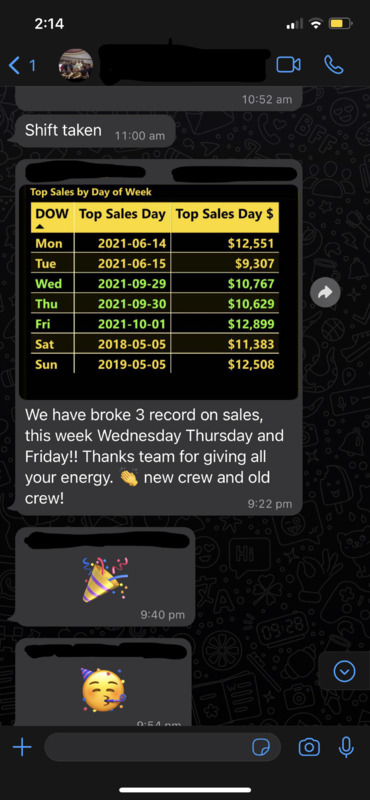 2021-09
2021-09Rising Profits
HIST30060: This is a screenshot of a whatsapp group chat for the workplace I was in during the sixth COVID lockdown in Melbourne. Despite restrictions being at its highest at this point, the profits for my workplace broke new records this week, similar as to how other major companies raked in major profits during the lockdown era. I remember working that Wednesday night, me and the few coworkers I was with were inundated mostly by online delivery orders but there was still a steady stream of customers coming in (quite often without masks) to order in person. There was little reward for our efforts, but at the very least I was afforded some peace and quiet on the commute home with the lockdowns in place. -
2020-03-05
The Sounds of a Casino
Living in Las Vegas and working in a hotel and casino, I got used to a few things; the sounds of the slot machines and the (albeit unpleasant) aroma of cigarettes and cigars. After being brought back to work after the shutdown, what I immediately noticed was how much quieter the casino floor was with all of the restrictions in place. There was a limit to how many guests we could have in, and social distancing meant only every other machine could be used. While wearing a mask and having plexiglass in front of my station, I had to get used to projecting my voice so that guests could hear me while I was trying to help them. Even now, I still wear a mask and have to actively make an effort to be heard. -
 2020-03-15
2020-03-15"Handwash Everyone"
I worked at a McDonald’s in March when the United States went into lockdown. Before the lockdown, the drive-thru line was long, the lobby was full of customers, and employee’s rushed around everywhere. The restaurant was always loud with fryers beeping, headsets beeping, customers ordering and complaining, and employee’s trying to have conversations with each other while taking orders all at the same time. People were constantly sneezing, coughing, or sounding like their voices were hoarse, and no one thought anything of it. Everyone went on about their business. After the pandemic, the restaurant was quieter. No more customers were in the lobby, fewer people came through the drive-thru, and fewer employees were at work, less food was being made, so the fryers beeped less often, as did the headsets that warned us when customers wanted to order. One new sound we could all rely on was the alarm that went off every hour, followed by a manager yelling out that everyone needed to wash their hands. The sound of a raspy voice from a customer, a sneeze, or a cough echoed from the speaker above side one in the kitchen, though the entire restaurant and employees would all look at each other in disgust, sure that this customer must have the Corona Virus. The employee in the first booth taking the payment would instantly remove their gloves and rush to scrub their hands before retrieving a new pair of gloves. The person in the second booth who handed the food out the window would be stretching their arm out the window as far as they could in an effort to stay as far away from the person as possible before repeating the same ritual as the last employee in disinfecting themselves. Sounds that usually just fell into the background noise and people assumed were allergies or just a simple cold suddenly elicited a significant amount of fear in my friends and co-workers. While things have mostly gone back to normal, the handwash alarm and manager yelling for a handwash is an hourly reminder that Covid-19 is still around. -
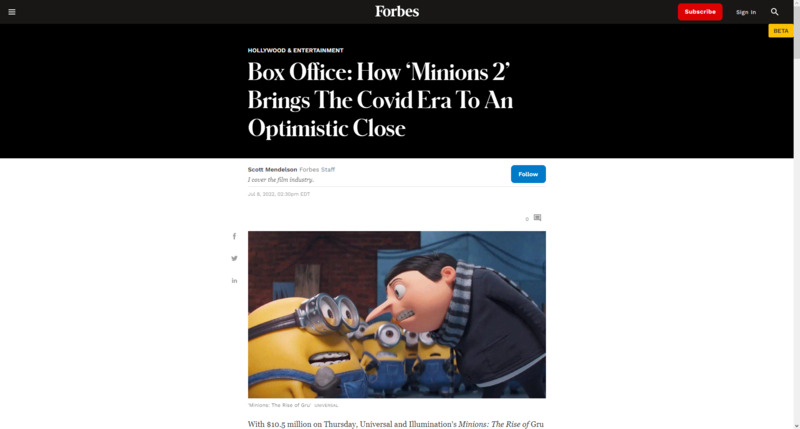 2022-07-08
2022-07-08Box Office: How ‘Minions 2’ Brings The Covid Era To An Optimistic Close
This is a news story from Forbes by Scott Mendelson. This is an article that discusses the moviegoing habits of people pre and post-COVID. The article mentions that Minions: The Rise of Gru and Top Gun: Maverick were meant to come out in 2020, but they were delayed because of COVID. Due to the high amounts of attendance to both films, the author is speculating that audience members that may have forgone streaming new movies are coming back to theaters. The box office gross for both films has broken records. Given my own experience of going to the movies recently since COVID began, I noticed that even though I did see signs about masks, it was never enforced, and restrictions were pretty much non-existent. I delayed going to the theaters in-person partly due to not finding many new releases interesting enough, in addition to not wanting to deal with masks while watching. I think that less restrictions make the experience more appealing now than during COVID, as movie tickets have been getting more expensive over the years. In can be hard to justify the steep prices with the restrictions in place that could make it less comfortable. My own experience that I had made it feel like it was the pre-COVID era, and that made it something I enjoyed. I think that given the snacks people eat at theaters, it would have been cumbersome to have to take the mask off and put it on again with eating. If I had to do that, I probably would not have wanted to get any snacks with those restrictions in place, and theaters generally make more revenue from refreshments than they do showing the movie itself. I think that the author is right that the high gross of both films mean that the "summer movie" is returning to what it once was, with audiences that may have been lost during COVID coming back. -
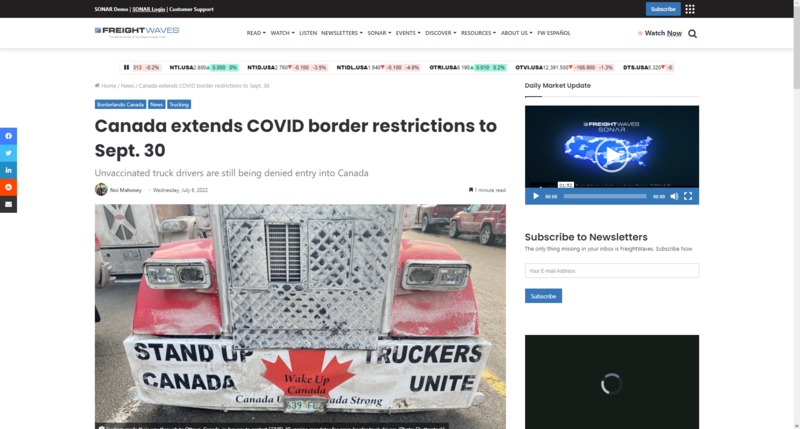 2022-07-06
2022-07-06Canada extends COVID border restrictions to Sept. 30
This is a news story from Freight Waves by Noi Mahoney. Canada's vaccine mandate for border-crossing truck drivers will remain in place until September 30. Americans crossing the Canadian border must be fully vaccinated and are subject to random testing. About 30,000 trucks cross the Canadian border each day. -
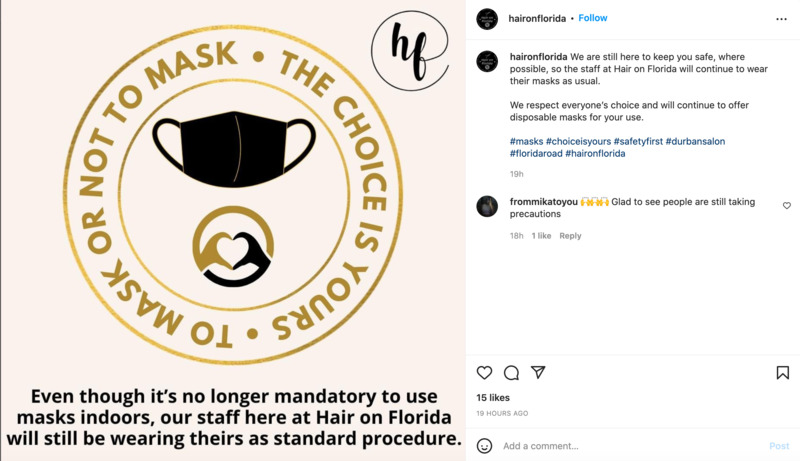 2022-06-25
2022-06-25The choice is yours
This is an Instagram post from haironflorida. The post says that the staff will continue wearing masks, but people are given the option of not wearing mask if they wish. -
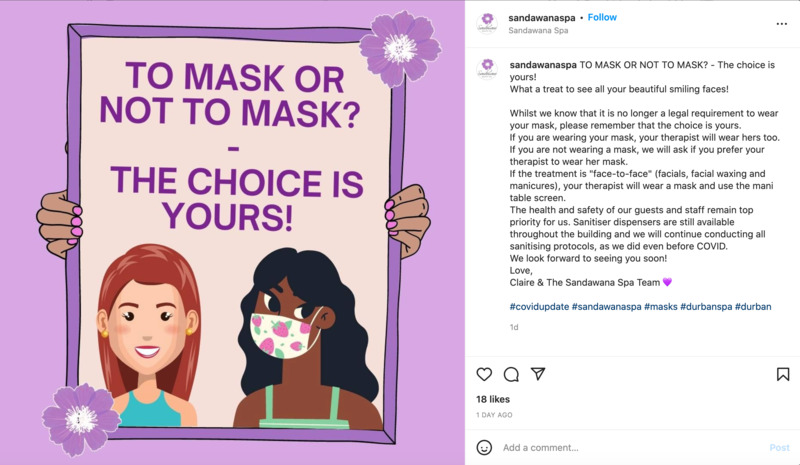 2022-06-25
2022-06-25To mask or not to mask
This is an Instagram post from sandawanaspa about masking. The company is saying that you no longer need a face mask as a requirement for their services. -
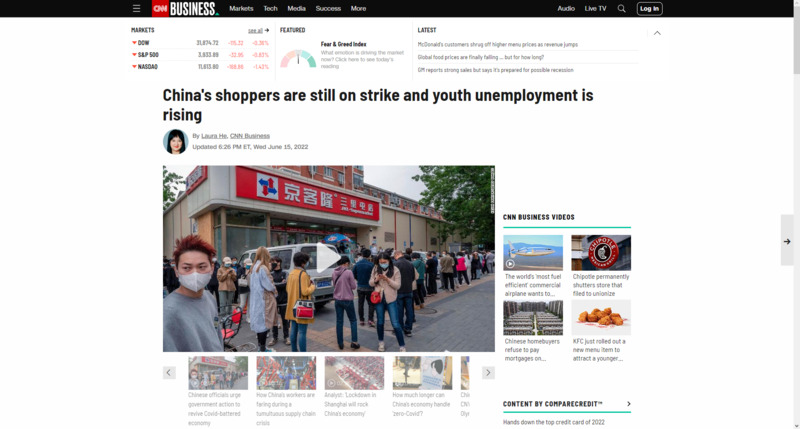 2022-06-15
2022-06-15China’s shoppers are still on strike and youth unemployment is rising
This is a news story from CNN by Laura He. This article is on the economic impact of China's zero COVID policy. Retail sales fell 6.7% in May according to China's National Bureau of Statistics. It is slightly lower than the 11. 1% drop in sales from April. Customer spending has fallen in about every category except for food, drink, and petroleum. Youth unemployment is rising in China, as places that would hire young workers were forced to shutdown with lockdowns. The youth unemployment rate rose 18.4% between the 16-24 range in China. -
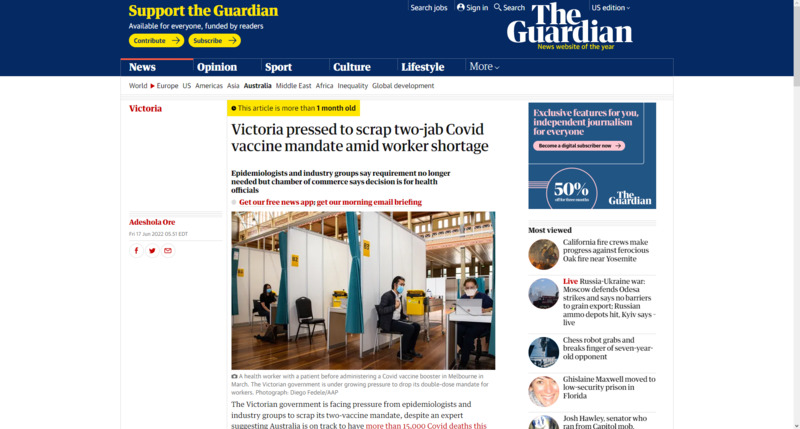 2022-06-17
2022-06-17Victoria pressed to scrap two-jab Covid vaccine mandate amid worker shortage
This is a news story from The Guardian by Adeshola Ore. The Victorian government has been pressed to stop the two-jab vaccine mandate due to a worker shortage. "While some industry groups have called for the two-dose mandate to be abolished to help ease the skilled workers shortage, the Victorian Chamber of Commerce and Industry (VCCI) said the decision was up to health officials." "Almost 95% of Victorians aged over 12 have received two doses of a Covid vaccine." -
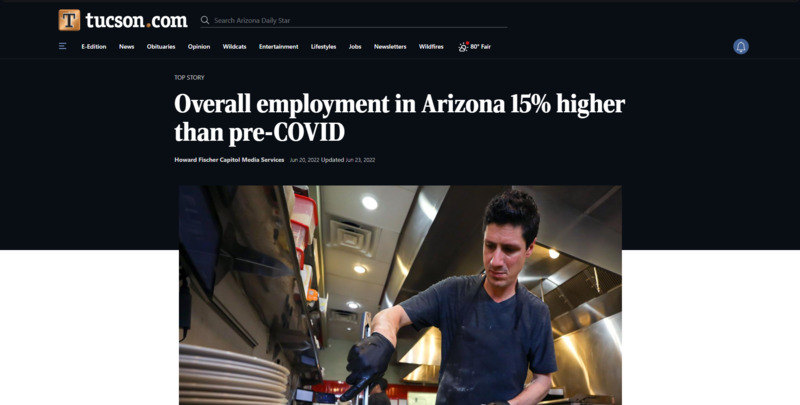 2022-06-16
2022-06-16Overall employment in Arizona 15% higher than pre-COVID
This is a news story from Tuscon.com. Overall, employment has risen by 15% compared to pre-COVID numbers. Bars, restaurants, and hotels have increased employment by 10.6% since last year. Permits issued for single and multi-family homes are down by about 16% compared to last year. There is also a 32.6% price increase on energy prices, being driven by rising gasoline prices. Overall, this article shows economic trends in Arizona and how COVID has impacted various industries and consumer trends. -
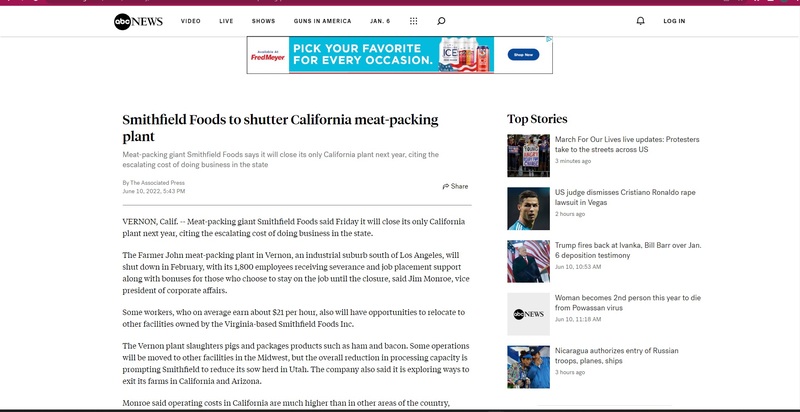 2022-06-10
2022-06-10Smithfield Foods to shutter California meat-packing plant
This is a news story from ABC News by The Associated Press. The shutdown of the Smithfield Foods plant in California is happening in part due to COVID. Some 300 employees were exposed to the virus in 2020, which created labor issues. Due to the exposure, California's Division of Occupational Safety and Health fined the company $60,000. -
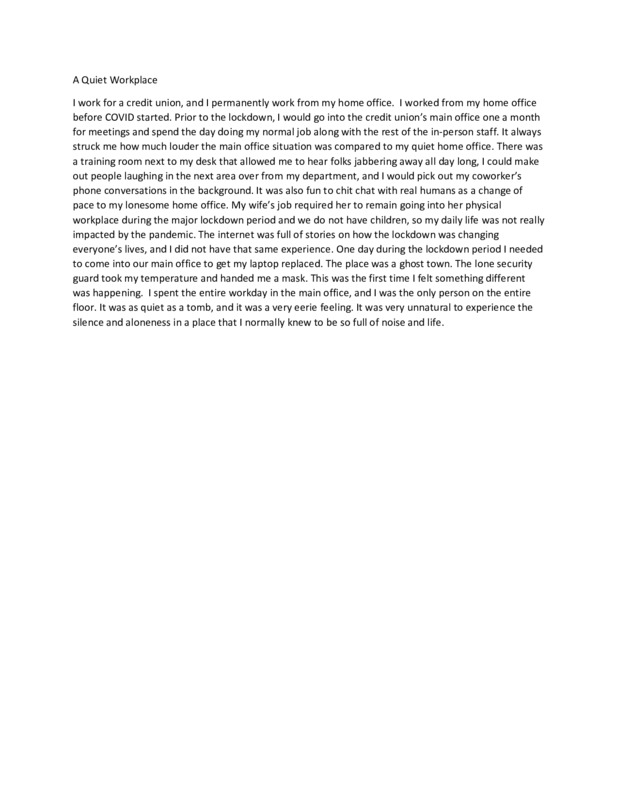 2022-05-27
2022-05-27A Quiet Workplace
This is to describe the sensory changes I experienced when I visited my employer's main office during the lockdown. -
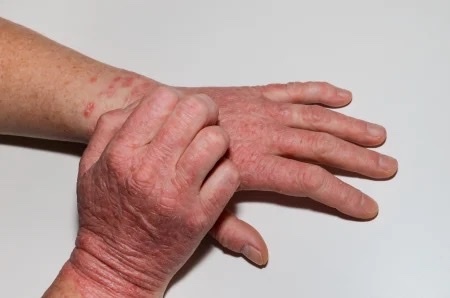 2022-05-25
2022-05-25My Hands Are Raw and I Can't Think
Listening to Marketplace on the radio each morning as I arrived at work in mid-January of 2020, I never suspected that what was forcing cancelations of Lunar New Year celebrations in China would leave me with raw hands and ringing ears. At that time, I was working at the Census Bureau for the lead person responsible for on-the-ground execution of the 2020 census in Idaho. The work involved data analysis and strategic planning, as we created and staffed a field operation to complement the Census Bureau’s attempt to transition from the traditional door-to-door canvassing to online self-reporting. In the early days of the pandemic, we tried to maintain business as usual as we, and most of the country, watched cases rise. When things got bad enough, a mandate from Washington shut down our office for nearly six weeks. When our team was called back, we entered a totally new world. The Census Bureau leadership had mandated a hyper safe work environment and work rules. The office furniture was completely rearranged to create social distance. A six-foot perimeter around every desk was marked on the floor to ensure work interactions took place at a distance. Similarly, walking paths were marked on the floor and one-way traffic was encouraged. Everyone was issued a box of masks and hand sanitizers and soap dispensers were everywhere. The visual was pretty laughable but it is my hands and ears that carry the strongest memories of attempting to work in this environment. Trying to comply with the guidelines meant more hand washing and sanitizing than one would likely see around an operating room. The government, while trying to be a really good parent, however, had failed to supply hand lotion. Shame on me! I didn’t bring my own and raw, chapped hands became my red badge of courage, and compliance. Additionally, I will never forget the volume in that concrete block room. A room full of people on the phone can be noisy; but social distanced work conversations meant masked people shouting to co-workers as they stood six feet from their desk. It was the definition of cacophony. The work I was doing required a lot of attention to detail and I remember it being so loud at times I could not think clearly. There were time I would go outside to listen to quiet of the traffic on the busy street in front of the office. -
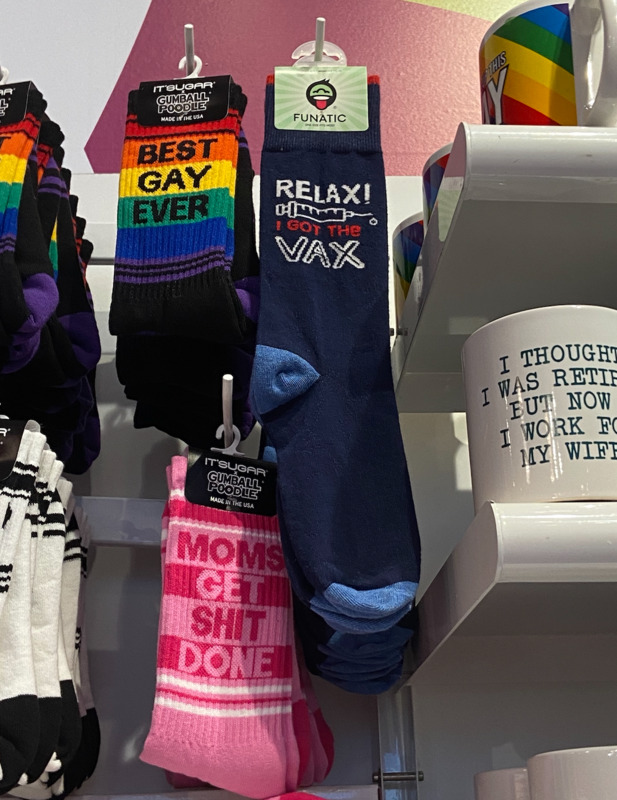 2022-05-23
2022-05-23Relax! I Got the Vax
This is a pair of socks I found at It's Sugar. They say "Relax! I Got the Vax" on them. This is referencing the COVID vaccines people have gotten. Now, places are selling merchandise referencing it as a way to get more money. Things like this are not uncommon and many big stores will sell vaccine related merchandise. I have no idea how well it actually sells, but there must be some market out there for companies to keep producing it. -
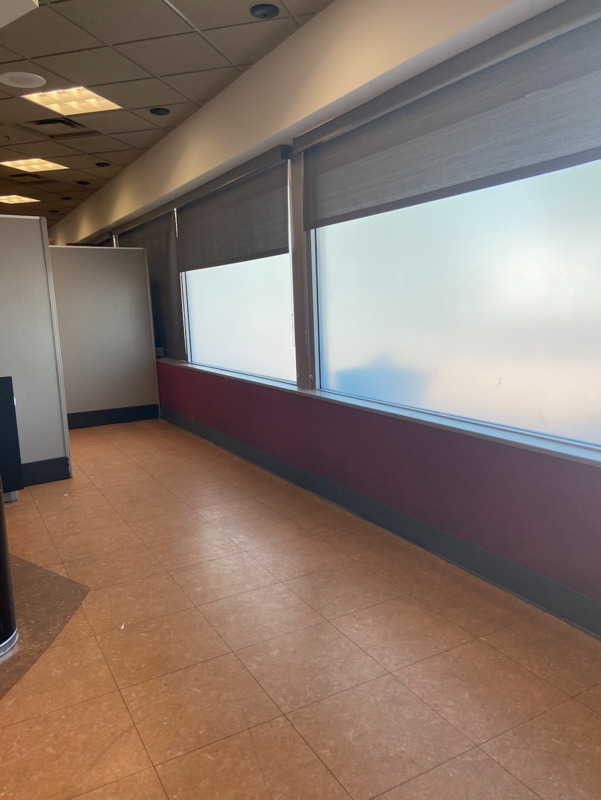 2022-05-23
2022-05-23Empty Seating at Starbucks
I have been to this Starbucks a few times over the years. This is a Starbucks inside Target. When I went there years ago, there used to be seating available for people to enjoy their beverages at leisure. Due to COVID, those seats are gone. I hope they get brought back eventually, because while I don't order from Starbucks that often, it was a nice place to sit while waiting for other people to get done shopping. -
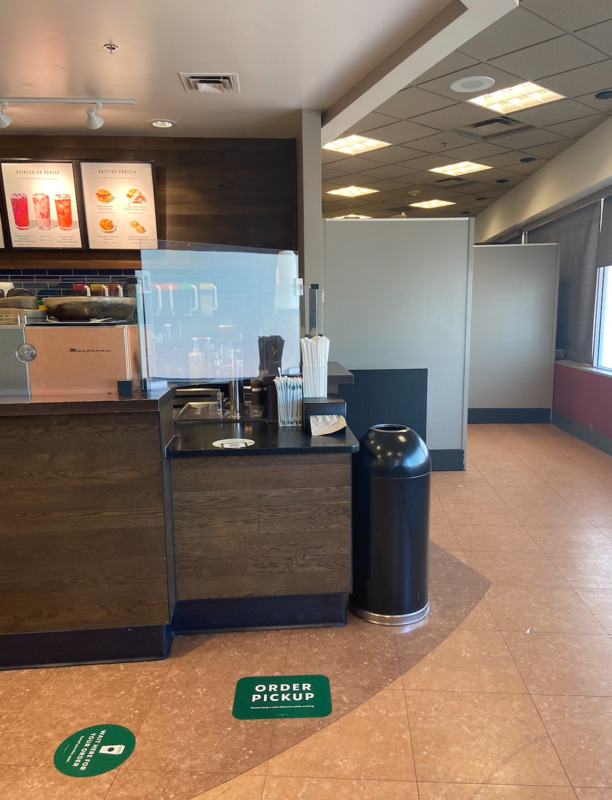 2022-05-23
2022-05-23Sneeze Guard at Starbucks
While at Target, I noticed a sneeze guard at the Starbucks inside it. I can't remember if the staff were wearing masks, but that is one COVID-era precaution I saw that is still in use. My sister was ordering something from there, so I took a picture while I was waiting for her to be done. -
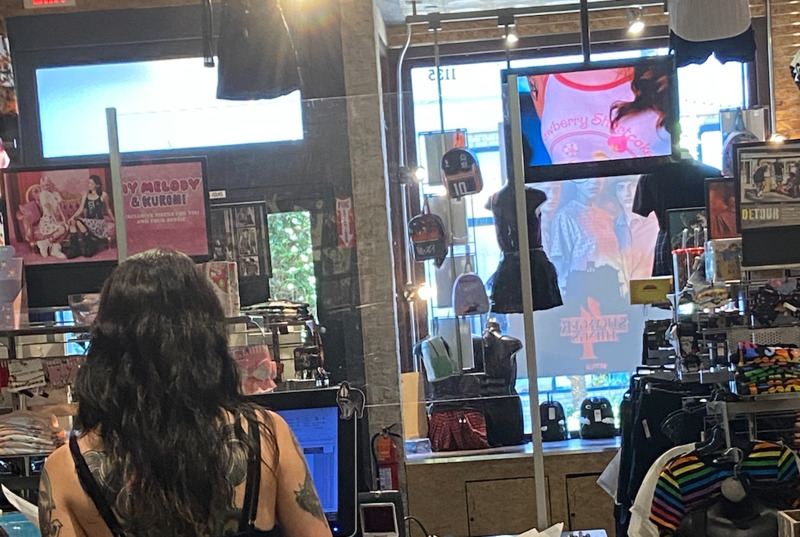 2022-05-23
2022-05-23Sneeze Guard at Hot Topic
This is a sneeze guard at Hot Topic. The staff themselves were not wearing masks, but the sneeze guards were still up. Since both cash registers were being used, I took a picture from the back for privacy reasons. -
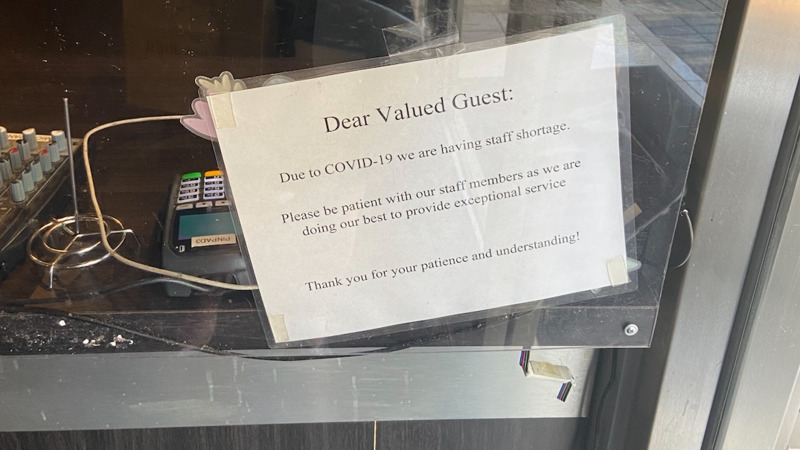 2022-05-23
2022-05-23COVID-19 Staff Shortage at Gen Korean Barbecue
Due to COVID-19, Gen, a Korean barbecue place, has had a staff shortage. Today I went there for lunch and noticed that there was fewer people working many tables than in times I have gone in the past. This speaks to the bigger labor issues that have come about since COVID. Some of it may be realizing that jobs like this aren't offering nearly enough to work there. Another possibility is that staff shortages might be happening from vaccine mandates, which depending on how many vaccines some place require, would be less appealing. The sign says that it is only due to COVID-19, but there are many components to that, so narrowing down the reason there are staff shortages could be difficult unless I asked the manager. -
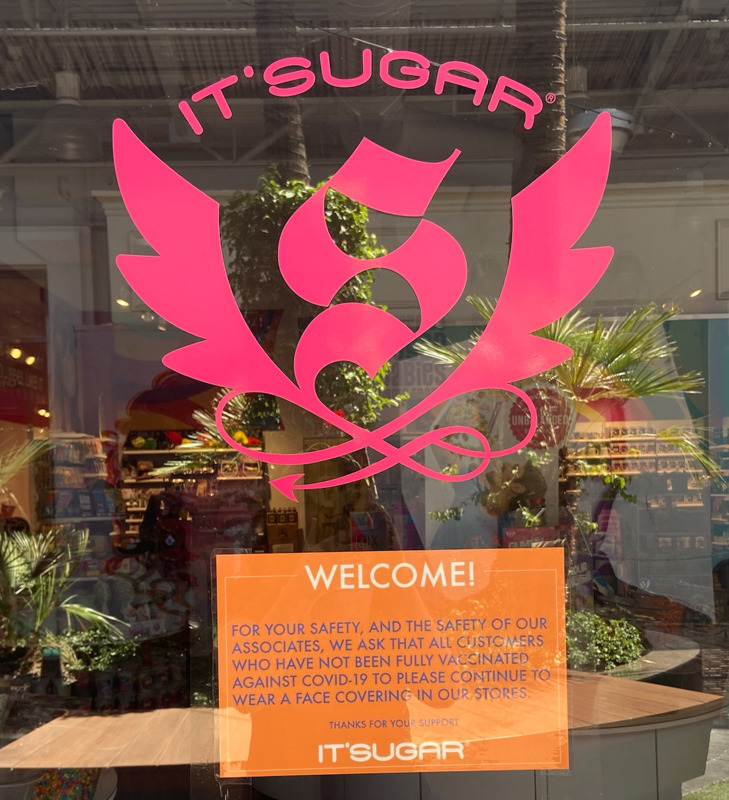 2022-05-23
2022-05-23Face Mask Suggestion Sign at It's Sugar
This is a sign on the front door of It's Sugar. It's Sugar is a chain candy store. Here, it is saying that those who have not been vaccinated should continue to wear a mask while inside the store. I went in there today, and no employee asked about my vaccination status, and the employees weren't masked. Arizona as a whole has been pretty light on COVID restrictions, but I imagine that other locations of this store might react differently. -
 2022-05-23
2022-05-23Cart Wipes at Target
This is where you can get cart wipes at Target while shopping. In addition to the thing itself, it gives you information on where to get a COVID vaccine. Wiping down surfaces has become a bigger thing since COVID, as it would help reduce the spread. COVID itself can't survive on surfaces for very long, but it can be there for a short amount of time. Using things like cart wipes is a way to prevent COVID and other diseases. -
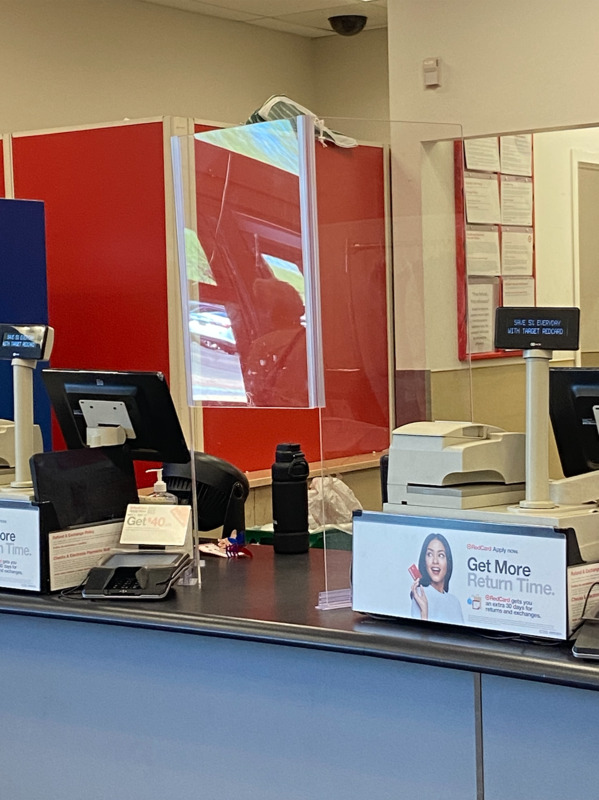 2022-05-23
2022-05-23Sneeze Guard in Target at Tempe Marketplace
This is a sneeze guard seen at Target. This is a COVID-era restriction meant to prevent the spread of COVID. Even though most restrictions are gone, these are still up.
